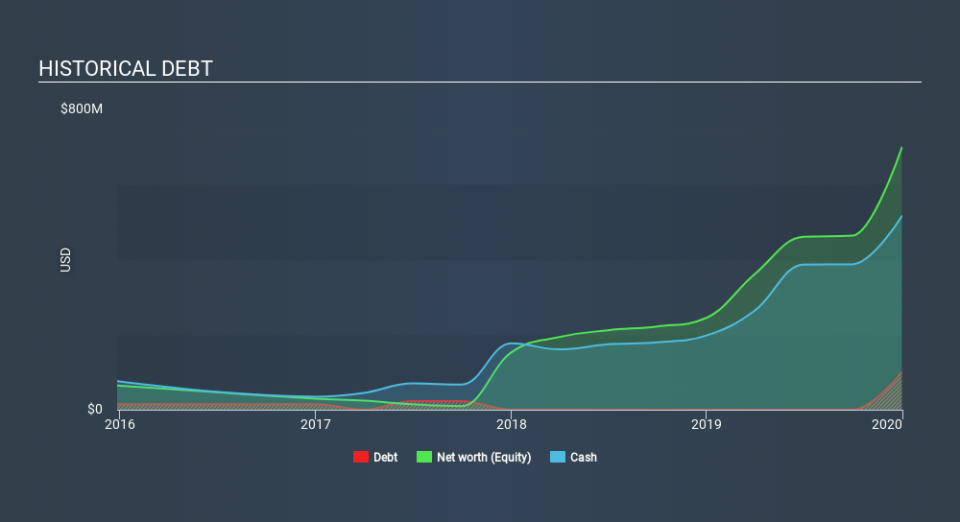Is Roku (NASDAQ:ROKU) Using Debt In A Risky Way?

Some say volatility, rather than debt, is the best way to think about risk as an investor, but Warren Buffett famously said that 'Volatility is far from synonymous with risk'. So it might be obvious that you need to consider debt, when you think about how risky any given stock is, because too much debt can sink a company. We can see that Roku, Inc. (NASDAQ:ROKU) does use debt in its business. But is this debt a concern to shareholders?
What Risk Does Debt Bring?
Generally speaking, debt only becomes a real problem when a company can't easily pay it off, either by raising capital or with its own cash flow. In the worst case scenario, a company can go bankrupt if it cannot pay its creditors. However, a more usual (but still expensive) situation is where a company must dilute shareholders at a cheap share price simply to get debt under control. Of course, debt can be an important tool in businesses, particularly capital heavy businesses. The first thing to do when considering how much debt a business uses is to look at its cash and debt together.
See our latest analysis for Roku
How Much Debt Does Roku Carry?
As you can see below, at the end of December 2019, Roku had US$99.6m of debt, up from none a year ago. Click the image for more detail. However, it does have US$515.5m in cash offsetting this, leading to net cash of US$415.9m.
A Look At Roku's Liabilities
The latest balance sheet data shows that Roku had liabilities of US$358.3m due within a year, and liabilities of US$413.5m falling due after that. Offsetting these obligations, it had cash of US$515.5m as well as receivables valued at US$336.3m due within 12 months. So it actually has US$79.9m more liquid assets than total liabilities.
This state of affairs indicates that Roku's balance sheet looks quite solid, as its total liabilities are just about equal to its liquid assets. So while it's hard to imagine that the US$11.4b company is struggling for cash, we still think it's worth monitoring its balance sheet. Succinctly put, Roku boasts net cash, so it's fair to say it does not have a heavy debt load! There's no doubt that we learn most about debt from the balance sheet. But ultimately the future profitability of the business will decide if Roku can strengthen its balance sheet over time. So if you want to see what the professionals think, you might find this free report on analyst profit forecasts to be interesting.
In the last year Roku wasn't profitable at an EBIT level, but managed to grow its revenue by 52%, to US$1.1b. With any luck the company will be able to grow its way to profitability.
So How Risky Is Roku?
We have no doubt that loss making companies are, in general, riskier than profitable ones. And we do note that Roku had negative earnings before interest and tax (EBIT), over the last year. And over the same period it saw negative free cash outflow of US$71m and booked a US$60m accounting loss. While this does make the company a bit risky, it's important to remember it has net cash of US$415.9m. That kitty means the company can keep spending for growth for at least two years, at current rates. With very solid revenue growth in the last year, Roku may be on a path to profitability. By investing before those profits, shareholders take on more risk in the hope of bigger rewards. The balance sheet is clearly the area to focus on when you are analysing debt. However, not all investment risk resides within the balance sheet - far from it. Take risks, for example - Roku has 2 warning signs we think you should be aware of.
If, after all that, you're more interested in a fast growing company with a rock-solid balance sheet, then check out our list of net cash growth stocks without delay.
If you spot an error that warrants correction, please contact the editor at editorial-team@simplywallst.com. This article by Simply Wall St is general in nature. It does not constitute a recommendation to buy or sell any stock, and does not take account of your objectives, or your financial situation. Simply Wall St has no position in the stocks mentioned.
We aim to bring you long-term focused research analysis driven by fundamental data. Note that our analysis may not factor in the latest price-sensitive company announcements or qualitative material. Thank you for reading.

 Yahoo Movies
Yahoo Movies 

